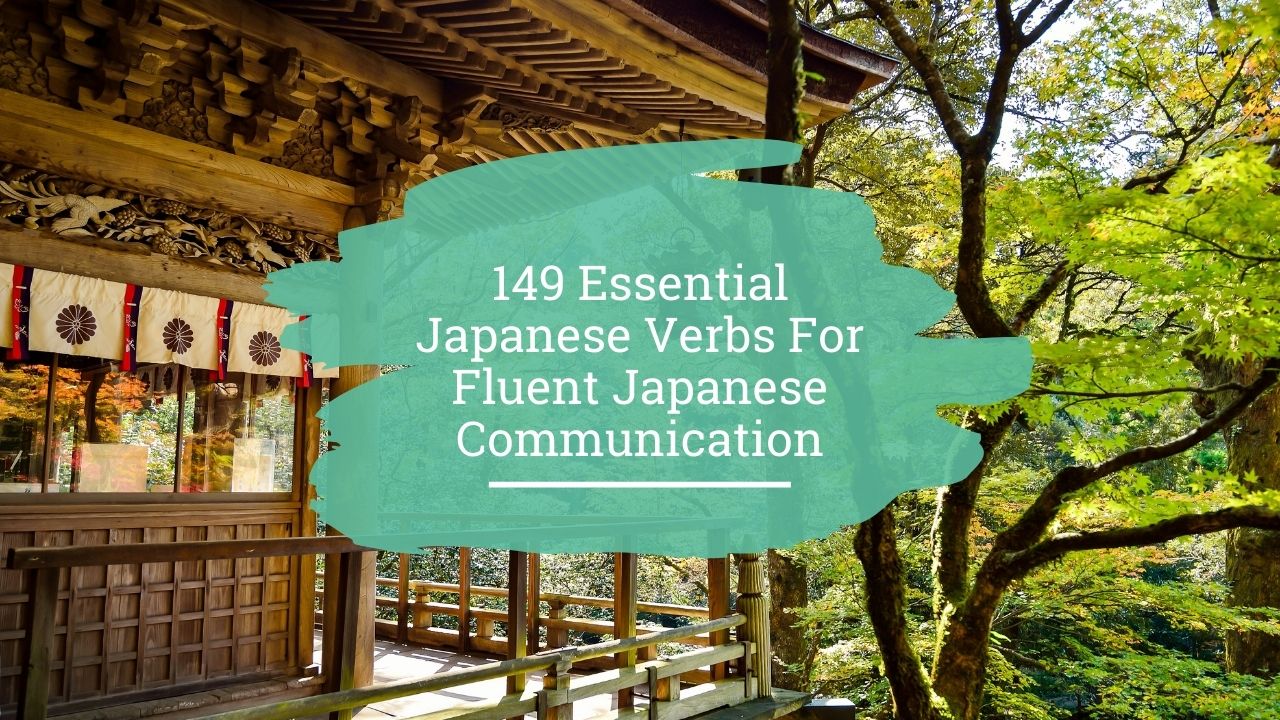Japanese verbs are the building blocks you need to learn Japanese; they describe what’s happening, and you can’t make Japanese sentences and speak the Japanese language without them. (Or at least, not for very long, and not very clearly.)
Learning some of the most commonly used verbs in the Japanese language is an easy way to boost your communication abilities exponentially.
As you consider how to begin your quest to learn Japanese, and understand Japanese words, take a look at the following list of over 100 Japanese verbs.
They’re some of the most common, which means you’ll vastly improve your expressive ability by mastering even a few of them.
Pro Tip
By the way, if you want to learn Japanese fast and have fun while doing it, my top recommendation is Japanese Uncovered which teaches you through StoryLearning®.
With Japanese Uncovered you’ll use my unique StoryLearning® method to learn Japanese naturally through story… not rules. It’s as fun as it is effective.
If you’re ready to get started, click here for a 7-day FREE trial.
Table of Contents
This verb list is in alphabetical order for the English translations of the Japanese verbs discussed to make it easier for you to find the Japanese verb you're looking for.
The list doesn't include basic how to conjugate Japanese verbs or the negative form of the verb. It does, however, include both regular and irregular Japanese verbs and shows you the dictionary form of the verb and how to use Japanese verbs in context with useful examples.
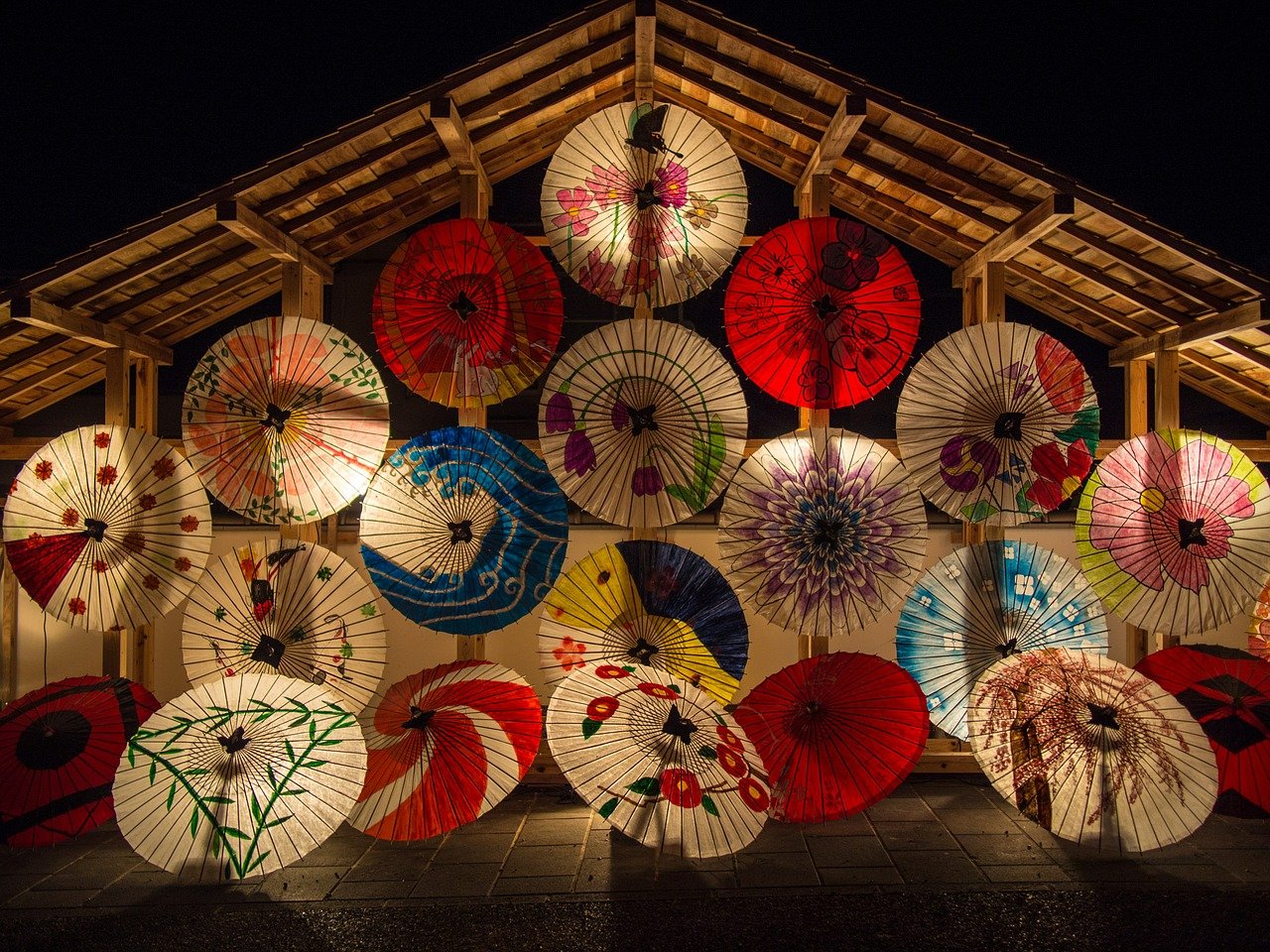
Japanese Verbs A – D
1. Add (To): KUWAERU
- What if you added water to it?
- mizu wo kuwaetara dou desu ka
- 水を加えたらどうですか。
- mizu wo kuwaetara dou desu ka
2. Add To: TSUKERU
- Please add a cake for Takeshi to the order.
- Takeshi-kun no ke-ki wo kanjou ni tsukete kudasai ne
- たけしくんのケーキを勘定に付けてくださいね。
- Takeshi-kun no ke-ki wo kanjou ni tsukete kudasai ne
3. Answer: KOTAERU
- I answered that question.
- Sono shitsumon ni kotaemashita
- その質問に答えました。
- Sono shitsumon ni kotaemashita
4. Apologize: AYAMARU
- Please apologize to Hinoko!
- Hinoko-san ni ayamatte kudasai
- ひのこさんに謝ってください
- Hinoko-san ni ayamatte kudasai
5. Arrive: TSUKU
- The ship will arrive by 5.
- Fune ha goji made ni ha tsuku deshou
- 船は五時までには着くでしょう。
- Fune ha goji made ni ha tsuku deshou
6. Ask: KIKU
- If you have a question, do feel free to ask.
- Shitsumon ga areba, kiite kudasai ne
- 質問があれば、聞いてくださいね。
- Shitsumon ga areba, kiite kudasai ne
7. Be Lazy: NAMAKERU
- I cautioned my daughter not to be lazy.
- Watashi ha musume wo namaketeiru to itte chuui shimashita
- 私は娘を怠けていると言って注意しました。
- Watashi ha musume wo namaketeiru to itte chuui shimashita
8. Be Late: OKURERU
- Oh no, I’m running late!
- Yabai, okureteiru!
- やばい、遅れている!
- Yabai, okureteiru!
9. Be Located: IRU [living]/ARU [non-living]
- Satsuki is at the bus stop.
- Basutei de Satsuki-san ha imasu
- バス停でさつきさんはいます。
- Basutei de Satsuki-san ha imasu

10. Be Mistaken: MACHIGAU
- Ah, Takeshi, right? Oh, I’m sorry, I was mistaken.
- Aa, Takeshi-kun deshou. Sumimasen, machigatteimasu.
- ああ、たけしくんでしょう。すみません、間違っています。
- Aa, Takeshi-kun deshou. Sumimasen, machigatteimasu.
11. Be Necessary: IRU
- Do you need anything?
- Nanika irimasu ka
- 何か要りますか。
- Nanika irimasu ka
12. Be Possible: DEKIRU
- I can speak Japanese!
- Nihongo ga dekiru!
- 日本語が出来る!
- Nihongo ga dekiru!
13. Be Sad: KANASHIMU
- I’m sad over my dog passing away.
- Inu no shi wo kanashindeiru
- 犬の死を悲しんでいる。
- Inu no shi wo kanashindeiru
14. Be Sufficient: TARIRU
- He really lacks [lit. “does not have sufficient”] motivation, doesn’t he?
- Kare ha shigeki ga tarinai ne
- 彼は刺激が足りないね
- Kare ha shigeki ga tarinai ne
15. Be Similar To: NIRU
- I’m not similar to my mother at all.
- Watashi ha haha ni zenzen niteimasen
- 私は母に全然似ていません。
- Watashi ha haha ni zenzen niteimasen
16. Become: NARU
- It’s getting dark outside.
- Soto ga kurakunaru.
- 外が暗くなる。
- Soto ga kurakunaru.
17. Believe: SHINJIRU
- Come on, I don’t believe that!
- He-, sono hanashi wo shinjinai yo!
- へー、その話を信じないよ!
- He-, sono hanashi wo shinjinai yo!
18. Be Born: UMARERU
- I was born in the year 2000.
- Watashi ha 2000 ni umareta
- 私は2000年に生まれた。
- Watashi ha 2000 ni umareta
19. Borrow: KARIRU
- Can I borrow your pencil?
- Enpitsu wo karite mo ii desu ka?
- えんぴつを借りてもいいですけ。
- Enpitsu wo karite mo ii desu ka?

20. Break: KOWARERU
- Oh no, the shell on the egg broke!
- Tamago no kara ha kowareta!
- 卵の殻は壊れた!
- Tamago no kara ha kowareta!
21. Buy: KAU
- What if you bought a new hat?
- Atarashii boushi wo kattara dou?
- 新しい帽子を買ったらどう?
- Atarashii boushi wo kattara dou?
22. Call: YOBU
- Call the police!
- Keisatsu wo yonde kudasai!
- 警察を呼んで下さい!
- Keisatsu wo yonde kudasai!
23. Catch: TSUKAMAERU
- Look, I caught a cute lizard!
- Mite mite, kawaii tokage wo tsukamaeta!
- 見て見て、かわいいトカゲを捕まえた!
- Mite mite, kawaii tokage wo tsukamaeta!
24. Cause: MOTARASU
- The cold temperature brings snow.
- Samui tenki ha yuki wo motarashimasu
- 寒い天気は雪をもたらします。
- Samui tenki ha yuki wo motarashimasu
25. Celebrate: IWAU
- This year, we celebrated my birthday at a sushi place.
- Kotoshi, sushiya de watashi no tanjoubi wo iwatta
- 今年、寿司屋で私の誕生日を祝った。
- Kotoshi, sushiya de watashi no tanjoubi wo iwatta
26. Change: KAWARU
- Could you change seats with me?
- Watashi to seki wo kawatte kurenai?
- 私と席を替わってくれない?
- Watashi to seki wo kawatte kurenai?
27. Check: SHIRABERU
- It would be best if you went and checked.
- Itte shirabeta hou ga ii desu yo
- 行って調べた方がいいですよ。
- Itte shirabeta hou ga ii desu yo
28. Close: SHIMARU
- Because it was summer vacation, the school was closed.
- Natsuyasumi na no de, gakkou ha shimatteita
- 夏休みなので、学校は閉まっていた。
- Natsuyasumi na no de, gakkou ha shimatteita
29. Come: KURU
- Mr. Yamada said boldly, “I will come to Shibuya next week!”
- Yamada-san ha “shibuya ni kuru zo” to iimashita
- 山田さんは「渋谷に来るぞ」と言いました。
- Yamada-san ha “shibuya ni kuru zo” to iimashita

30. Depend On: YORU
- An author’s credibility depends on how reliable their sources are.
- Chosha ni kan suru shinpyousei ha shiryou no shinpyousei ni yotteimasu
- 著者に関する信憑性は資料の信憑性に因っています。
- Chosha ni kan suru shinpyousei ha shiryou no shinpyousei ni yotteimasu
31. Dislike: IYAGARU
- I really dislike when people tell me to hurry.
- Watashi ha isoge to iwareru no wo iyagaru
- 私は急げと言われるのを嫌がる。
- Watashi ha isoge to iwareru no wo iyagaru
32. Do: SURU
- I do lots of sports.
- Takusan supo-tsu wo shimasu
- たくさんスポーツをします。
- Takusan supo-tsu wo shimasu
33. Drink: NOMU
- I don’t want to drink tea.
- Ocha wo nomitakunai yo
- お茶を飲みたくないよう。
- Ocha wo nomitakunai yo
Japanese Verbs E – I
34. Eat: TABERU
- Is it okay if I eat this now?
- Tabete mo ii desu ka
- 食べてもいいですか。
- Tabete mo ii desu ka
35. End: OWARU
- Once this job is done, I’m going home.
- Kono shigoto ga owaru to kaeru tsumori desu
- この仕事が終わると変えるつもりです。
- Kono shigoto ga owaru to kaeru tsumori desu
36. Enjoy: TANOSHIMU
- I’ll really enjoy myself to the fullest!
- Juubun ni tanoshimimasu
- 十分に楽しみます
- Juubun ni tanoshimimasu
37. Enter: HAIRU
- Can I come in?
- Haitte mo ii desu ka
- 入ってもいいですか。
- Haitte mo ii desu ka
38. Exit: DERU
- Michiko left town as soon as she graduated.
- Michiko-san ha sotsugyou suru to sugu ni machi wo deteita
- みちこさんは卒業するとすぐに町を出ていた。
- Michiko-san ha sotsugyou suru to sugu ni machi wo deteita
39. Feel: KANJIRU
- I didn’t actually feel any pain.
- Nan no itami mo kanjimasen deshita
- 何の痛みも感じませんでした。
- Nan no itami mo kanjimasen deshita

40. Find: MITSUKERU
- I can’t believe it, but I got lost trying to find the bus stop.
- Basutei wo mitsuke you toshita ga michi ni mayotte shimatta
- バス停を見つけようとしたが道に迷ってしまった。
- Basutei wo mitsuke you toshita ga michi ni mayotte shimatta
41. Finish: SUMASERU
- After I’ve finished with my homework, I’ll get some food.
- Shukudai wo sumasetara, tabe ni ikou
- 宿題をすませたら、食べに行こう。
- Shukudai wo sumasetara, tabe ni ikou
42. Forget: WASURERU
- Oh crap, I forgot my ticket!
- Shimatta, kippu wo wasurechatta!
- しまった、切符を忘れちゃった!
- Shimatta, kippu wo wasurechatta!
43. Forgive: YURUSU
- I’m so sorry, please forgive me!
- Gomen nasai, onegai, yurushite kudasai!
- ごめんなさい、おねがい、許してください!
- Gomen nasai, onegai, yurushite kudasai!
44. Get Back: TORIKAESU
- Thankfully, he got his lost wallet back.
- Nusumareta saifu wo torikaeshita
- 盗まれた財布を取り返した。
- Nusumareta saifu wo torikaeshita
45. Get Up: OKIRU
- I get up at about 7 every day.
- Watashi ha mainichi 7 ji ni okimasu
- 私は毎日7時に起きます。
- Watashi ha mainichi 7 ji ni okimasu
46. Go: IKU
- In the future, I want to go to Japan.
- Watashi ha shourai, nihon ni ikitai desu
- 私は将来、日本に行きたいです。
- Watashi ha shourai, nihon ni ikitai desu
47. Be Happy: YOROKOBU
- My little sister was really happy to get a present.
- Imouto ha purezento wo moratte yorokonda
- 妹はプレゼントをもらって喜んだ。
- Imouto ha purezento wo moratte yorokonda
48. Hear: KIKU
- It was hard to hear the teacher.
- Sensei no kotoba wo kiku no ha muzukashikatta
- 先生の言葉を聞くのは難しかった。
- Sensei no kotoba wo kiku no ha muzukashikatta
49. Help (Rescue): TASUKERU
- Wow, you really saved me!
- Hontou ni tasukatta ne
- 本当に助かったね
- Hontou ni tasukatta ne

50. Help (To Do Work): TETSUDAU
- Hey, come and help with your sister’s work.
- Oi, oneesan no shigoto wo tetsudatte koi
- おい、お姉さんの仕事を手伝って来い。
- Oi, oneesan no shigoto wo tetsudatte koi
51. Hire: YATOU
- This company doesn’t hire programmers from that school.
- Kono kaisha ha sono gakkou ni sotsugyou shita purogurama- wo yatowanai
- この会社はその学校に卒業したプログラマーを雇わない。
- Kono kaisha ha sono gakkou ni sotsugyou shita purogurama- wo yatowanai
52. Hold (In Hand): MOTSU
- I carry my books in my hands instead of in a backpack.
- Bakkupakku no kawari ni te de hon wo motteimasu
- バックパックの代わりに手で本を持っています。
- Bakkupakku no kawari ni te de hon wo motteimasu
53. Hurry: ISOGU
- Because I got lost, I have to hurry!
- Michi ni mayotta no de, isoganakya ikenai!
- 道に迷ったので、急がなきゃいけない!
- Michi ni mayotta no de, isoganakya ikenai!
54. Include: FUKUMERU
- Everyone including the dog hopped into the car.
- Inu mo fukumete zenin kuruma ni hairimashita
- 犬も含めて全員、車に入りました。
- Inu mo fukumete zenin kuruma ni hairimashita
Japanese Verbs J – M
55. Jump: TOBU
- I’ve figured out a new way of doing the ski jump!
- Atarashii suki-janpu no tobikata wo hakken shimashita
- 新しいスキージャンプの飛び方を発見しました。
- Atarashii suki-janpu no tobikata wo hakken shimashita
56. Keep (an Animal): KAU
- I keep a lizard as a pet.
- Watashi ha tokage wo katteiru
- 私はトカゲを飼っている。
- Watashi ha tokage wo katteiru
57. Know: SHIRU
- Hey, did you know? Takeshi’s married now!
- Ne, shitteiru? Takeshi-kun ga kekkon shiteimasu!
- ね、知っている?たけしくんが結婚しています!
- Ne, shitteiru? Takeshi-kun ga kekkon shiteimasu!
58. Laugh: WARAU
- As soon as he saw the weird-looking dog, he laughed.
- Kare ha hen na inu wo mite waratta
- 彼は変な犬を見て笑った。
- Kare ha hen na inu wo mite waratta
59. Learn: MANABU
- It’s okay to just learn a little bit every day.
- Mainichi sukoshi zutsu manande mo ii desu yo
- 毎日少しずつ学んでもいいですよ。
- Mainichi sukoshi zutsu manande mo ii desu yo

60. Leave Behind/Unfinished: NOKOSU
- I left my friend a bit of yakisoba.
- Watashi ha tomodachi ni sukoshi yakisoba wo nokoshite agemashita
- 私は友達に少し焼きそばを残してあげました。
- Watashi ha tomodachi ni sukoshi yakisoba wo nokoshite agemashita
61. Leave (To Someone): MAKASERU
- I’ll leave it to Ueda to buy our tickets.
- Kippu no tehai ha Ueda ni makaseyou
- 切符の手配は上田に任せよう。
- Kippu no tehai ha Ueda ni makaseyou
62. Lend: KASU
- Could you lend me your umbrella?
- Kasa wo kashite kuremasen ka
- 傘を貸してくれませんか。
- Kasa wo kashite kuremasen ka
63. Live: KURASU
- Our dog and cat live peacefully together.
- Inu to neko ha nakayoku isshou ni kurashiteimasu
- 犬と猫は仲良く一生に暮らしています。
- Inu to neko ha nakayoku isshou ni kurashiteimasu
64. Look At/See: MIRU
- I’ve never seen a lizard before.
- Tokage wo mita koto nai yo
- トカゲを見たことないよ。
- Tokage wo mita koto nai yo
65. Look At Again: MINAOSU
- Let’s take another look at your test answers.
- Tesuto no kotae wo minaoshite mimashou
- テストの答えを見直してみましょう。
- Tesuto no kotae wo minaoshite mimashou
66. Look Back: FURIKAERU
- Looking back on your childhood can be sad.
- Kodomo no koro wo furikaeru koto ha kanashii.
- 子供のころを振り返ることは悲しい。
- Kodomo no koro wo furikaeru koto ha kanashii.
67. Lose: NAKUSU
- Oh no, I lost my train ticket!
- Kippu wo nakushite shimaimashita!
- 切符をなくしてしまいました!
- Kippu wo nakushite shimaimashita!
68. Lose A Contest: MAKERU
- My mom lost to me in baseball.
- Haha ha watashi ni yakyuu de makemashita
- 母は私に野球で負けました。
- Haha ha watashi ni yakyuu de makemashita
69. Love: AI SURU
- She loves him dearly.
- Kanojo ha kare wo ai shiteimasu
- 彼女は彼を愛しています。
- Kanojo ha kare wo ai shiteimasu
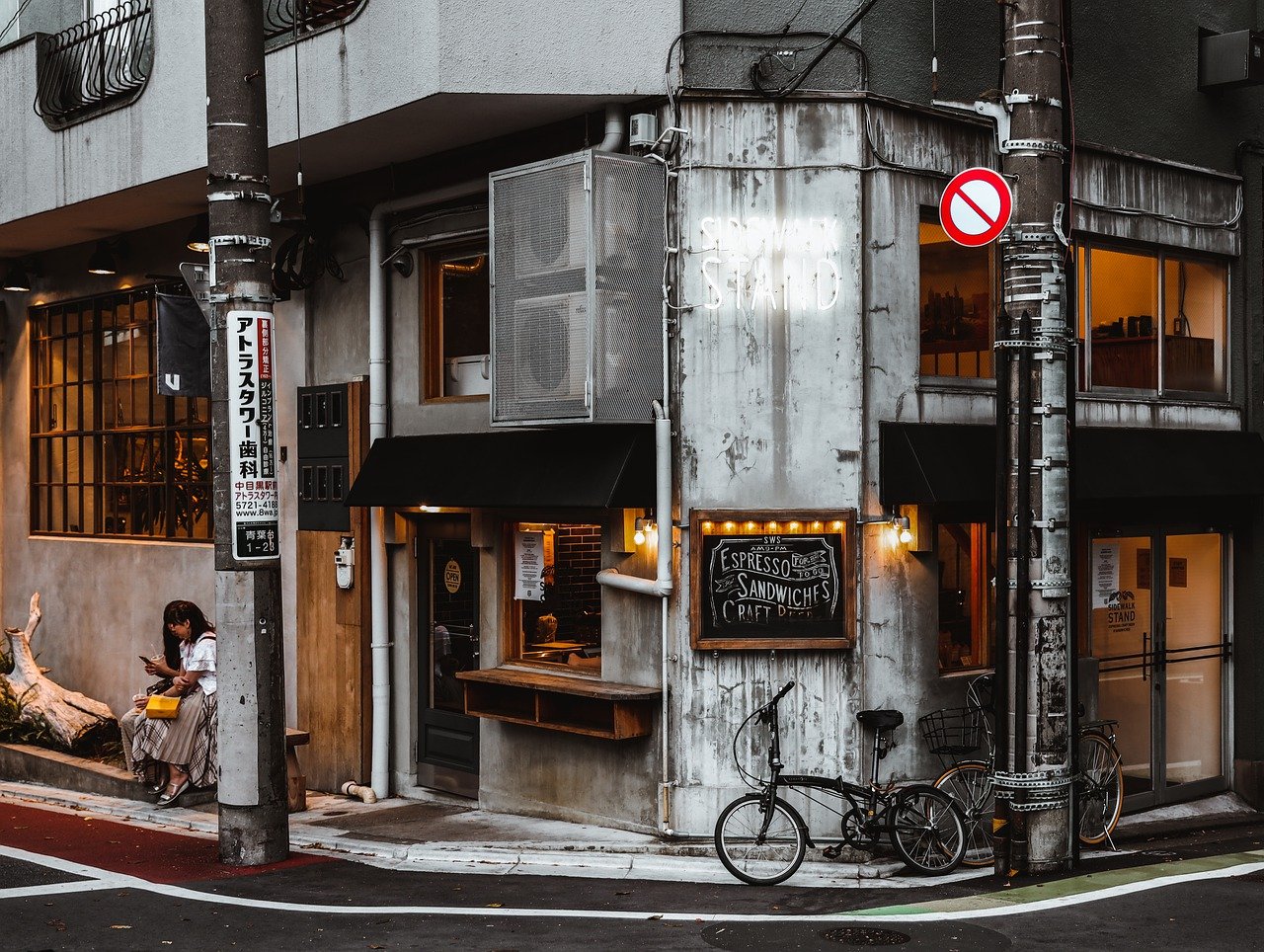
70. Make: TSUKURU
- That’s made by a famous celebrity, right?
- Yuumeijin ga tsukuttamono deshou
- 有名人が作ったものでしょう。
- Yuumeijin ga tsukuttamono deshou
71. Meet: AU
- Someday, it would be so awesome to meet Hayao Miyazaki.
- Shourai, Miyazaki Hayao ni au to ii ne
- 将来、みやざきはやおに合うといいね。
- Shourai, Miyazaki Hayao ni au to ii ne
72. Move: UGOKU
- I don’t even know how long the car didn’t move [i.e. “we were in a traffic jam forever”].
- Kuruma de nanjikan mo ugokanakatta
- 車で何時間も動かなかった。
- Kuruma de nanjikan mo ugokanakatta
Japanese Verbs N – R
73. Open: HIRAKU
- Please open your eyes!
- Me wo hirakinasai
- 目を開きなさい。
- Me wo hirakinasai
74. Pay: HARAU
- Sorry, you have to pay in advance here.
- Sumimasen ga, mae motte okane wo haratte okanakereba narimasen
- すみませんが、前もってお金を払っておかなければなりません。
- Sumimasen ga, mae motte okane wo haratte okanakereba narimasen
75. Play: ASOBU
- Don’t ever play in the road.
- Zettai ni douro de asobanai
- 絶対に道路で遊ばない
- Zettai ni douro de asobanai
76. Pull: HIKU
- You have to draw five cards!
- Ka-do wo gomai hikanakya naranai
- カードを五枚引かなきゃならない。
- Ka-do wo gomai hikanakya naranai
77. Push: OSU
- When I pushed the button, the radio turned on.
- Boton wo oshite rajio wo tsuketa
- ボトンを押してラジオをつけた。
- Boton wo oshite rajio wo tsuketa
78. Put On Top Of: NOSERU
- He put bags full of rice on the table.
- Kome no ippai haitta fukuro wo shokutaku ni nosemashita
- 米の一杯入った袋を食卓に乗せました。
- Kome no ippai haitta fukuro wo shokutaku ni nosemashita
79. Read: YOMU
- One more time, please read these kanji.
- Mou ichidou kono kanji wo yonde kudasai
- もう一度この漢字を読んで下さい。
- Mou ichidou kono kanji wo yonde kudasai
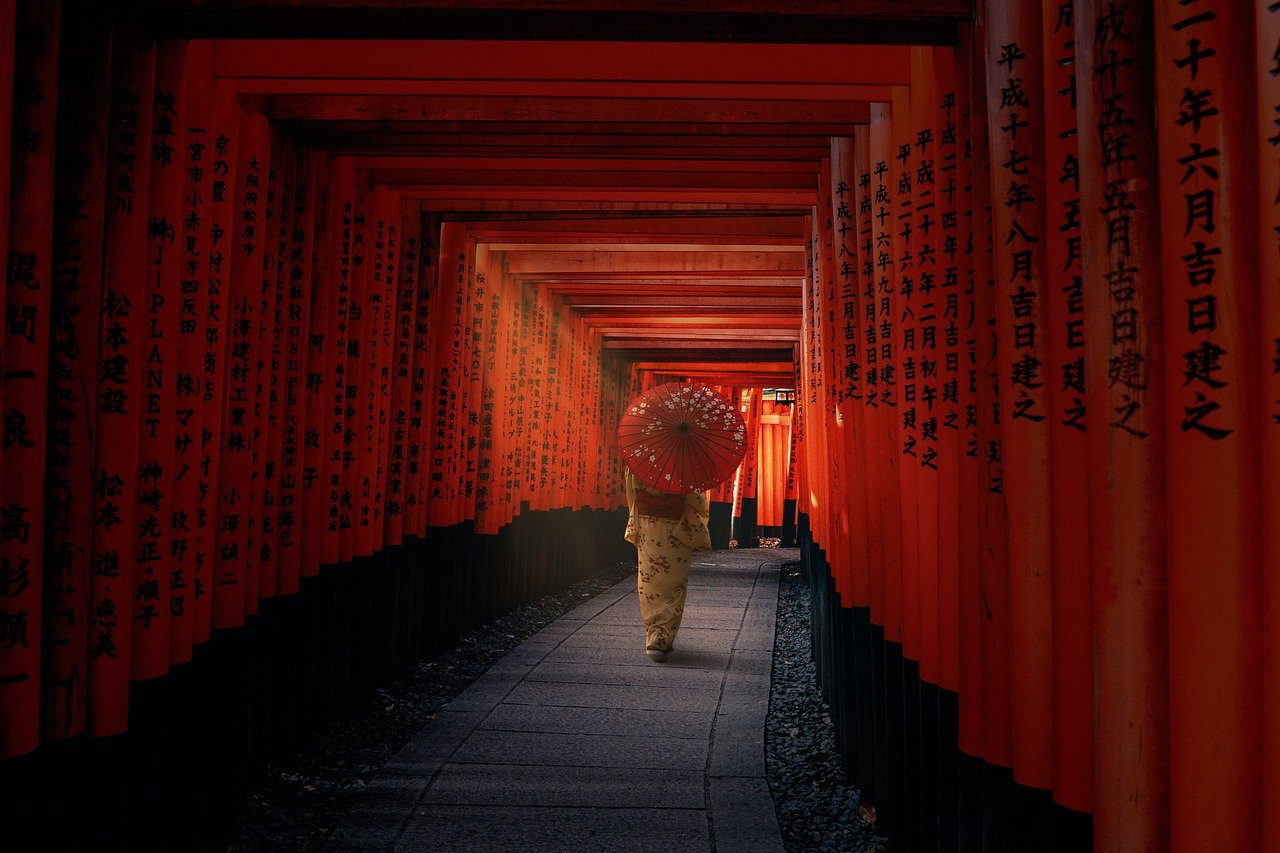
80. Receive: MORAU
- Mr. Suzuki was kind enough to send me a book [that I received with gratitude].
- Watashi ha Suzuki san ni hon wo okutte moratta
- 私は、鈴木さんに、本を送ってもらった。
- Watashi ha Suzuki san ni hon wo okutte moratta
81. Remember: OBOERU
- Are you able to remember what kind of person your friend was?
- Tomodachi ha donna hito datta ka oboeraremasu ka
- 友達はどんな人だったか覚えられますか。
- Tomodachi ha donna hito datta ka oboeraremasu ka
82. Return: MODORU
- Let’s return to our hotel for the day.
- Sate, hoteru ni modorou
- さて、ホテルに戻ろう。
- Sate, hoteru ni modorou
83. Return Home: KAERU
- Once it got dark, we went back home.
- Yoru ni natte, ie he kaerimashita
- 夜になって、家へ帰りました。
- Yoru ni natte, ie he kaerimashita
Japanese Verbs S – W
84. Say: IU
- The teacher said, “We have a test on Friday.”
- Sensei ha “kinyoubi ni testo ga aru” to iimashita
- 先生は「金曜日にテストがある」と言いました。
- Sensei ha “kinyoubi ni testo ga aru” to iimashita
85. Search For: SAGASU
- I’m searching for a part time job during summer vacation.
- Natsuyasumi ni arubaito wo sagashiteiru
- 夏休みにアルバイトを探している
- Natsuyasumi ni arubaito wo sagashiteiru
86. Be Able To See: MIERU
- I’ve had so much to drink that I can see double!
- Dabu te mieru gurai yottemasu
- ダブって見えるぐらい酔ってます。
- Dabu te mieru gurai yottemasu
87. Sell: URU
- My favorite sushi shop sells hamachi nigiri.
- Ichiban daisuki na sushiya ha hamachi nigiri wo utteimasu
- 一番大好きな寿司屋ははまちにぎりを打っています。
- Ichiban daisuki na sushiya ha hamachi nigiri wo utteimasu
88. Show: MISERU
- Wow, you bought a new car? Show me!
- He-, atarashii kuruma wo katta? Misete!
- へー、新しい車を買った?見せて!
- He-, atarashii kuruma wo katta? Misete!
89. Sing: UTAU
- My favorite hobby is singing at karaoke.
- Ichiban suki na shumi ha karaoke de utau koto da
- 一番好きな趣味はカラオケで歌うことだ。
- Ichiban suki na shumi ha karaoke de utau koto da
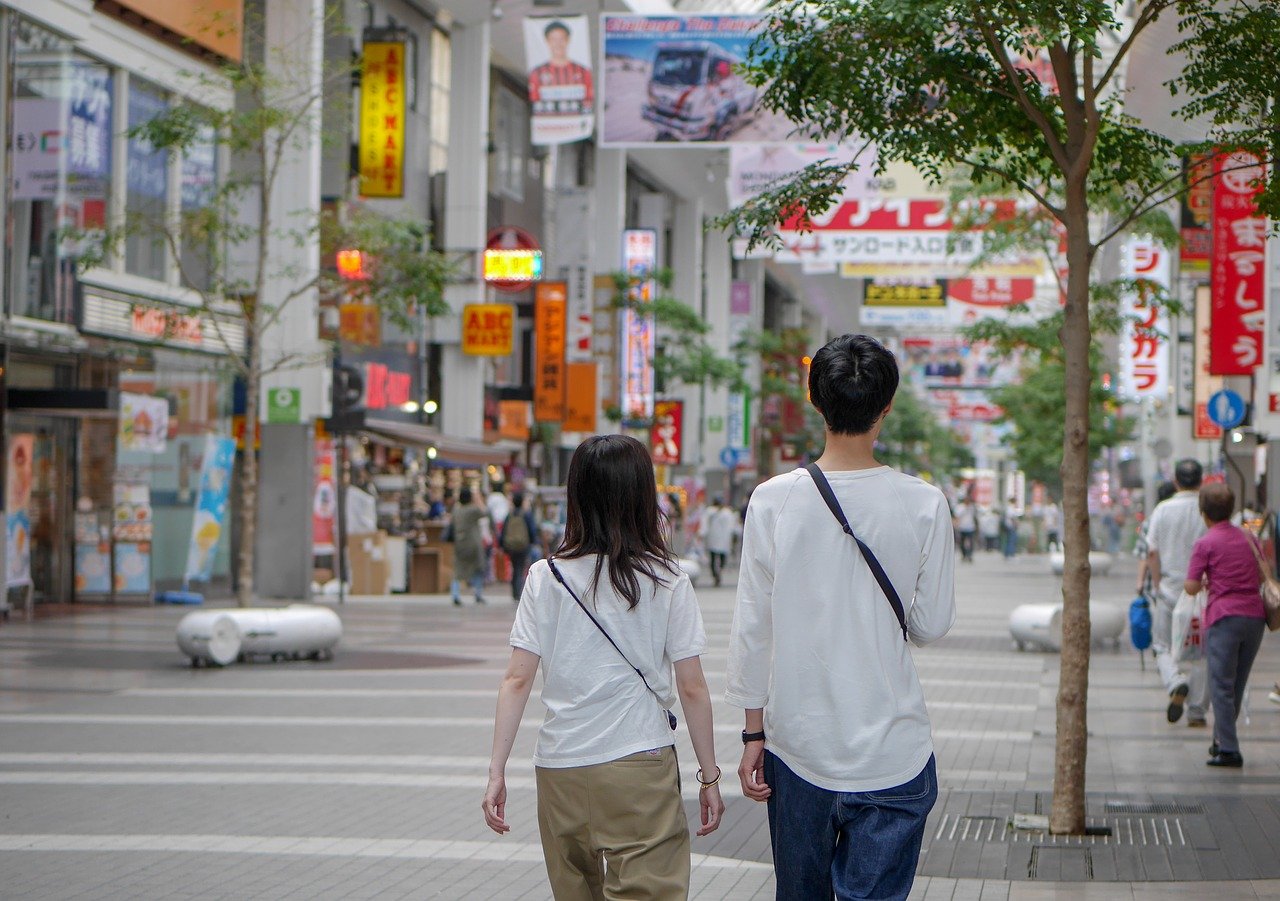
90. Sit: SUWARU
- Class is starting, please sit down!
- Jugyou wo hajimeru zo, suwatte ne
- 授業を始めるぞ、座ってね。
- Jugyou wo hajimeru zo, suwatte ne
91. Sleep: NERU
- I plan to sleep after I eat dinner.
- Bangohan wo taberu to neru tsumori desu
- 晩ご飯を食べると寝るつもりです。
- Bangohan wo taberu to neru tsumori desu
92. Speak: HANASU
- I find speaking Japanese to be easy.
- Nihongo ha hanashiyasui to omoimasu
- 日本語は話しやすいと思います。
- Nihongo ha hanashiyasui to omoimasu
93. Stand: TATSU
- My legs fell asleep, so I couldn’t stand.
- Ashi ga shibirete, tatenakatta
- 足がしびれて、立てなかった。
- Ashi ga shibirete, tatenakatta
94. Study: BENKYOU SURU
- I’m studying Japanese so that I can be closer to my friends.
- Nakayoku naru you ni nihongo wo benkyou shiteiru
- 仲良くなるように日本語を勉強している。
- Nakayoku naru you ni nihongo wo benkyou shiteiru
95. Take: TORU
- Is it okay to take pictures here?
- Shashin wo totte mo daijoubu desu ka
- 写真をとっても大丈夫ですか。
- Shashin wo totte mo daijoubu desu ka
96. Think: OMOU
- I’m thinking about trying that new kind of yakisoba.
- Ano atarashii yakisoba wo tabetemiru to omotteimasu
- あの新しい焼きそばを食べてみると思っています。
- Ano atarashii yakisoba wo tabetemiru to omotteimasu
97. Wait: MATSU
- Let’s wait here, okay?
- Koko de machimashou ne
- ここで待ちましょうね。
- Koko de machimashou ne
98. Walk: ARUKU
- It’s impolite to eat while walking around.
- Arukinagara taberu koto ha shitsurei da ne
- 歩きながら食べることは失礼だね。
- Arukinagara taberu koto ha shitsurei da ne
99. Wear (On Head): KABURU
- Are you wearing a new hat today?
- Kyou atarashii boushi wo kabutteiru?
- 今日新しい帽子を被っている?
- Kyou atarashii boushi wo kabutteiru?

100. Wear (On Torso): KIRU
- You should wear a suit for the interview.
- Kaiken suru toki ni su-tsu wo kita hou ga ii deshou
- 会見する時にスーツを着た方がいいでしょう。
- Kaiken suru toki ni su-tsu wo kita hou ga ii deshou
101. Win: KATSU
- I wanted my sister to win.
- Imouto ni katte hoshikatta
- 妹に勝ってほしかった。
- Imouto ni katte hoshikatta
102. Wish For: INORU
- I’m wishing for it with all my heart.
- Kokoro wo komete inotteimasu
- 心を込めて祈っています。
- Kokoro wo komete inotteimasu
103. Work: HATARAKU
- I worked at a business called Otsuka in Shiga prefecture.
- Shigaken de aru ootsuka to iu kaisha de hatarakimashita
- 滋賀県である「大塚」という会社で働きました。
- Shigaken de aru ootsuka to iu kaisha de hatarakimashita
104. Write: KAKU
- The most difficult part of writing Japanese is the kanji.
- Nihongo de ichiban muzukashii koto ha kanji no kakikata desu
- 日本語で一番難しいことは漢字の書き方です。
- Nihongo de ichiban muzukashii koto ha kanji no kakikata desu
45 Bonus Japanese Verbs

Wow, you're doing great with already over 100 most common Japanese verbs in this list. But there's more.
Did you learn a new Japanese verb from the list so far?
The following 45 Japanese verbs will also come in handy for everyday communication and your ability to speak the Japanese language. Enjoy!
105. Stay Overnight: TOMARU
- I will stay at the Motel 8.
- Motel 8 de tomarimasu.
- Motel 8で泊まります。
- Motel 8 de tomarimasu.
106. To Accept/Get: UKETORU
- She accepted her birthday gift.
- Tanjoubi no okurimono wo uketorimashita.
- 誕生日の贈り物を受け取りました。
- Tanjoubi no okurimono wo uketorimashita.
107. To Be (Non-Living): ARU
- There is a chair in this room.
- Kono heya de isu ga aru.
- この部屋でいすがある。
- Kono heya de isu ga aru.
108. To Be Effective: KIKU
- The medicine worked a little bit.
- Kusuri ga sukoshi kikimashita.
- 薬が少し効きました。
- Kusuri ga sukoshi kikimashita.
109. To Learn: NARAU
- I want to learn Japanese.
- Nihongo wo naraitai desu.
- 日本語を習いたいです。
- Nihongo wo naraitai desu.

110. To Dance: ODORU
- No thanks, I don’t want to dance.
- Iie, odoritakunai yo.
- いいえ、踊りたくないよ。
- Iie, odoritakunai yo.
111. To Be Surprised: BIKKURI SURU
- The kids were surprised at the large bear.
- Kodomotachi ha ookii kuma ni bikkuri shita.
- 子供たちは大きいくまにびっくりした。
- Kodomotachi ha ookii kuma ni bikkuri shita.
112. To Deliver (Something): TODOKERU
- Because the refrigerator was too large, we had it delivered.
- Reizouko ha ookisugita no de, todokesaseta.
- 冷蔵庫は大きすぎたので、届けさせた。
- Reizouko ha ookisugita no de, todokesaseta.
113. To Protect: MAMORU
- I’m so scared! Please protect me!
- Kowai yo! Mamotte kure!
- こわいよ!守ってくれ!
- Kowai yo! Mamotte kure!
114. To Come To Stay Overnight: TOMARI NI KURU
- My friend came to our house to stay overnight.
- Watashi no tomodachi ha uchi no ie ni tomari ni kimashita.
- 私の友達はうちの家に泊まりに来ました。
- Watashi no tomodachi ha uchi no ie ni tomari ni kimashita.
115. To Be Called: YOBARERU
- That star is called Sirius.
- Ano hoshi ha “Sirius” to yobareteimasu.
- あの星はシリウスと呼ばれています。
- Ano hoshi ha “Sirius” to yobareteimasu.
116. To Rely On: TAYORU
- When I fell ill, I relied on him.
- Byouki ni natta toki ni, kare ni tayotta.
- 病気になった時に、かれに頼った。
- Byouki ni natta toki ni, kare ni tayotta.
117. To Visit/Enquire: TAZUNERU
- We plan to visit Meiji Shrine.
- Meiji jinguu wo tazuneru tsumori desu.
- 明治神宮を訪ねるつもりです。
- Meiji jinguu wo tazuneru tsumori desu.
118. To Overlook: MINOGASU
- That teacher will never overlook a mistake!
- Sono sensei ha zettai ni machigai wo minogasanai!
- その先生は絶対に間違いを見逃さない。
- Sono sensei ha zettai ni machigai wo minogasanai!
119. To Come Home: KAETTE KURU
- Oh, when did you come home?
- Aa, itsu kaette kimashita ka?
- ああ、いつ帰って来ましたか。
- Aa, itsu kaette kimashita ka?

120. To Come Back: MODOTTE KURU
- It’s okay, my dog will come back.
- Daijoubu desu yo. Inu ha modotte kimasu.
- 大丈夫ですよ。犬は戻って来ます。
- Daijoubu desu yo. Inu ha modotte kimasu.
121. To Hit: NAGURU
- My friend hit me.
- Tomodachi ha watashi wo nagutta.
- 友達は私を殴った。
- Tomodachi ha watashi wo nagutta.
122. To Fight: TATAKAU
- If you’re going to take my dog, I’ll fight!
- Watashi no inu wo tottara, tatakaimasu yo!
- 私の犬をお取ったら、戦いますよ。
- Watashi no inu wo tottara, tatakaimasu yo!
123. To Think (About): KANGAERU
- I’m thinking about trying some mochi.
- Mochi wo tabete miru to kangaeteimasu.
- もちを食べてみると考えています。
- Mochi wo tabete miru to kangaeteimasu.
124. To Lift Up: MOCHIAGERU
- She couldn’t lift up the heavy box.
- Kanojo ha omoi hako wo mochiagenakatta.
- 彼女は重い箱を持ち上げられなかった。
- Kanojo ha omoi hako wo mochiagenakatta.
125. To Be Delivered: TODOKU
- Did any mail get delivered?
- Tegami ga todoiteiru?
- 手紙が届いている?
- Tegami ga todoiteiru?
126. To Be Put: OKARERU
- The book was put on the table.
- Hon ha teburu ni okareta.
- 本はテーブルに置かれた。
- Hon ha teburu ni okareta.
127. To Hate: KIRAI DESU
- I love sushi, but I hate inarizushi.
- Sushi ga suki dakedo, inarizushi ga kirai desu.
- 寿司が好きだけど、いなり寿司が嫌いです。
- Sushi ga suki dakedo, inarizushi ga kirai desu.
128. To Be Photographed: UTSURU
- Everybody who was photographed is a woman.
- Shashin ni utsutteiru kata ha josei desu.
- 写真に写っている方は女性です。
- Shashin ni utsutteiru kata ha josei desu.
129. To Put Away: SHIMAU
- Hey, you’re not listening. Please put your manga away.
- Ne, kiiteimasen. Manga wo shimatte kudasai.
- ね、聞いていません。漫画を仕舞ってください。
- Ne, kiiteimasen. Manga wo shimatte kudasai.

130. To Lay Out (Flat): SHIKU
- She laid out her new bedsheets.
- Atarashii shiitsu wo shikimashita.
- 新しいシーツを敷きました。
- Atarashii shiitsu wo shikimashita.
131. To Wipe: FUKU
- Just like always, I exercised and then wiped my face with a towel.
- Itsumo doori ni undou suru to taoru de kao wo fuita.
- いつも通りに運動するとタオルで顔を拭いた。
- Itsumo doori ni undou suru to taoru de kao wo fuita.
132. To Polish: MIGAKU
- I brushed [lit. polished] my teeth and then drank some water.
- Ha wo migaite, mizu wo nomimashita.
- 歯を磨いて、水を飲みました。
- Ha wo migaite, mizu wo nomimashita.
133. To Use: TSUKAU
- I’d like to use that pen if that’s okay.
- Daijoubu dattara, sono pen wo tsukaitai.
- 大丈夫だったら、そのペンを使いたい。
- Daijoubu dattara, sono pen wo tsukaitai.
134. To Be Increased: FUERU
- If you work, your earnings will increase.
- Hataraitara, shotoku ga fueru deshou.
- 働いたら、所得が増えるでしょう。
- Hataraitara, shotoku ga fueru deshou.
135. To Buy (And Give To Someone): KATTE AGERU
- I will buy this sushi to give to my friends.
- Tomodachi ni kono sushi wo katte agemasu.
- 友達にこの寿司を買ってあげます。
- Tomodachi ni kono sushi wo katte agemasu.
136. To Take A Liking To: KI NI IRU
- I’ve really taken a liking to Takeshi.
- Takeshikun ga ki ni itteimasu.
- たけしくんが気に入っています。
- Takeshikun ga ki ni itteimasu.
137. To Banter/Make Fun Of: HIYAKASU
- They made fun of Sasaki’s bicycle.
- Sasakisan no jitensha wo hiyakashimashita.
- ささきさんの自転車を冷やかしました。
- Sasakisan no jitensha wo hiyakashimashita.
138. To Put On (Lower Half Of The Body): HAKU
- He put on his new shoes.
- Atarashii kutsu wo hakimashita.
- 新しいくつを履きました。
- Atarashii kutsu wo hakimashita.
139. To Invite: SASOU
- Is it okay to invite my sister too?
- Oneesan mo sasotte mo ii desu ka.
- お姉さんも誘ってもいいですか。
- Oneesan mo sasotte mo ii desu ka.

140. Wanted: HOSHIKATTA
- I wanted a dog.
- Inu ga hoshikatta.
- 犬が欲しかった。
- Inu ga hoshikatta.
141. To Leave: HANARERU
- I won’t leave you!
- Hanarenai yo!
- 離れないよ!
- Hanarenai yo!
142. To Lie: ITSUWARU
- She lied about how old she was.
- Josei ha nenrei wo itsuwatta.
- 女性は年齢を偽った。
- Josei ha nenrei wo itsuwatta.
143. To Quit: YAMERU
- Ouch! Please stop!
- Itai! Yamete kudasai!
- いたい!止めてください!
- Itai! Yamete kudasai!
144. To Touch: SAWARU
- Please do not touch that exhibit.
- Ano shutten wo sawaranai de kudasai.
- あの出展を触らないでください。
- Ano shutten wo sawaranai de kudasai.
145. To Warm Up: ATATAMERU
- I’ll warm up some milk and enjoy a relaxed day.
- Miruku wo atatamete, yukkuri yasumimasu.
- ミルクを温めて、ゆっくり休みます。
- Miruku wo atatamete, yukkuri yasumimasu.
146. To Give: AGERU
- She gave me a gift.
- Kanojo ha okurimono wo agemashita.
- 彼女は贈り物をあげました。
- Kanojo ha okurimono wo agemashita.
147. To Please Stay: INASAI
- Hey now, just a second, please stay here.
- Maa, chotto, inasai yo.
- まあ、ちょっと、いなさいよ。
- Maa, chotto, inasai yo.
148. To Start to Look After: MIHAJIMERU
- Her dog is okay! I just started looking after it.
- Inu ha daijoubu desu! Mihajimemashita.
- 犬は大丈夫です。み始めました。
- Inu ha daijoubu desu! Mihajimemashita.
149. To Be Cute: KAWAIGARU
- That dog is SO cute.
- Sono inu ha totemo kawaigatteiru!
- その犬はとてもかわいがっている!
- Sono inu ha totemo kawaigatteiru!
Japanese Verbs FAQ
How many verbs are in Japanese?
Japanese has thousands of verbs, but they all fall into three main categories: Group 1 (Godan), Group 2 (Ichidan), and Irregular Verbs.
While there is no exact count, the most commonly used verbs in daily conversation number in the hundreds.
The two main irregular verbs, する (suru, “to do”) and くる (kuru, “to come”), don't follow standard conjugation patterns.
How to Know if a Japanese Verb is U or Ru?
Japanese verbs are classified as U-verbs (Godan) or Ru-verbs (Ichidan) based on their dictionary form.
Ru-verbs typically end in -eru or -iru (e.g., 食べる – taberu, 見る – miru).
U-verbs end in other sounds, including -u, -ku, -mu(e.g., 書く – kaku, 飲む – nomu).
Some exceptions exist, so memorisation and practice help distinguish them.
Japanese Verbs: What To Take Away
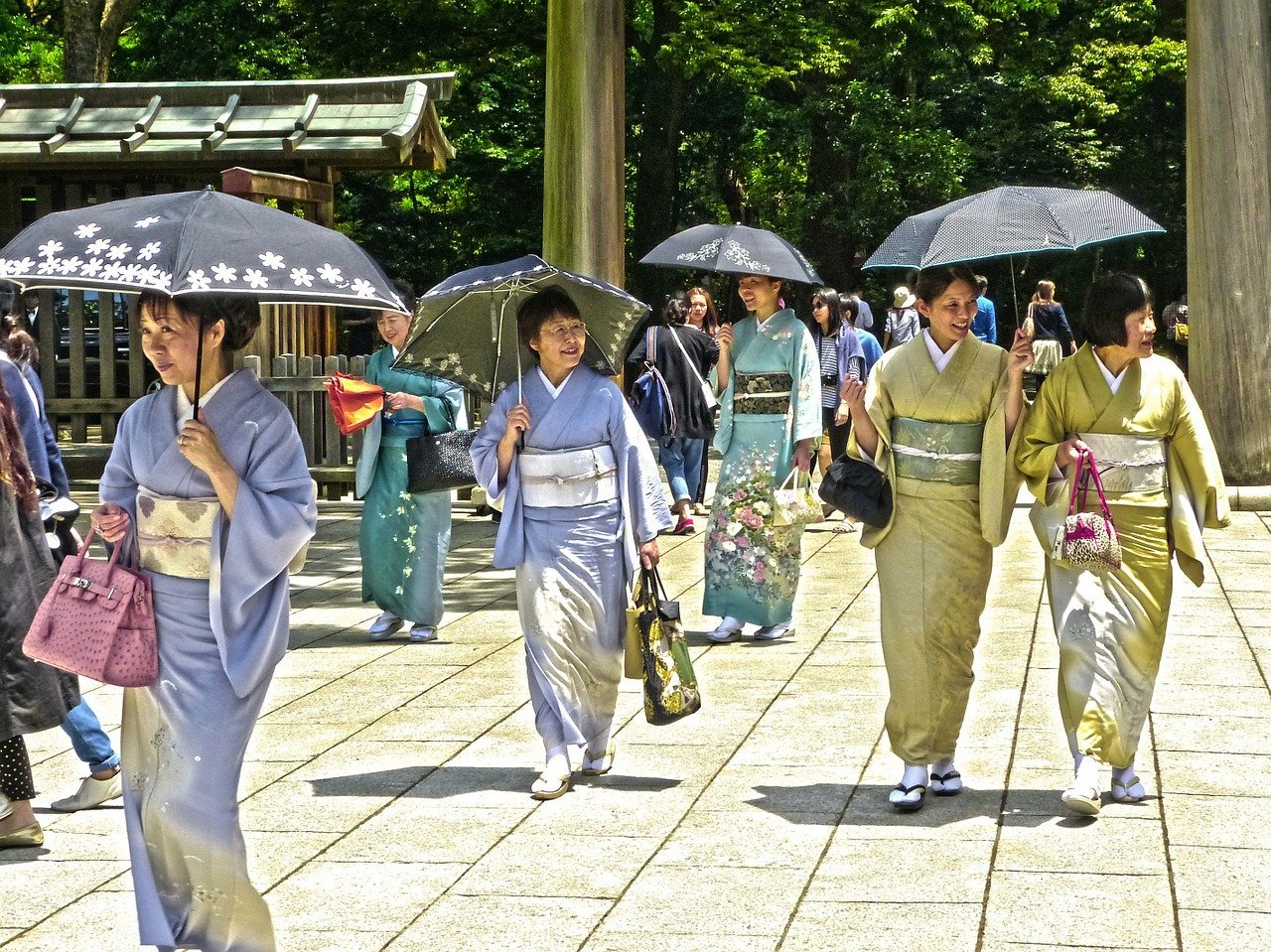
Whether you knew some of these Japanese verbs or none at all, adding new Japanese vocabulary to your repertoire is one of the most powerful tools at your disposal in language learning.
Mastering these essential Japanese verbs can give you the communication power that you need to expand your knowledge even further.
Now you have a grasp on some Japanese verbs; your next step will be to learn some Japanese verb conjugation. Verb conjugation in the Japanese language is not a bit tricky (as you might think). Once you know the verb, you know it!
The best way to continue to learn Japanese verbs is to immerse yourself in your new language. And when you apply the StoryLearning® method that means immersion through reading.
You'll learn a wide range of Japanese verbs and words that are valuable and useful to you, specifically by immersing yourself in books.
Take a look here at some of the best Japanese books for beginner learners. Focus on mastering a few words at a time so that you’re not overwhelmed, and watch your Japanese skill grow like a snowball as you keep on rolling.
Good luck!

Olly Richards
Creator of the StoryLearning® Method
Olly Richards is a renowned polyglot and language learning expert with over 15 years of experience teaching millions through his innovative StoryLearning® method. He is the creator of StoryLearning, one of the world's largest language learning blogs with 500,000+ monthly readers.
Olly has authored 30+ language learning books and courses, including the bestselling "Short Stories" series published by Teach Yourself.
When not developing new teaching methods, Richards practices what he preaches—he speaks 8 languages fluently and continues learning new ones through his own methodology.
